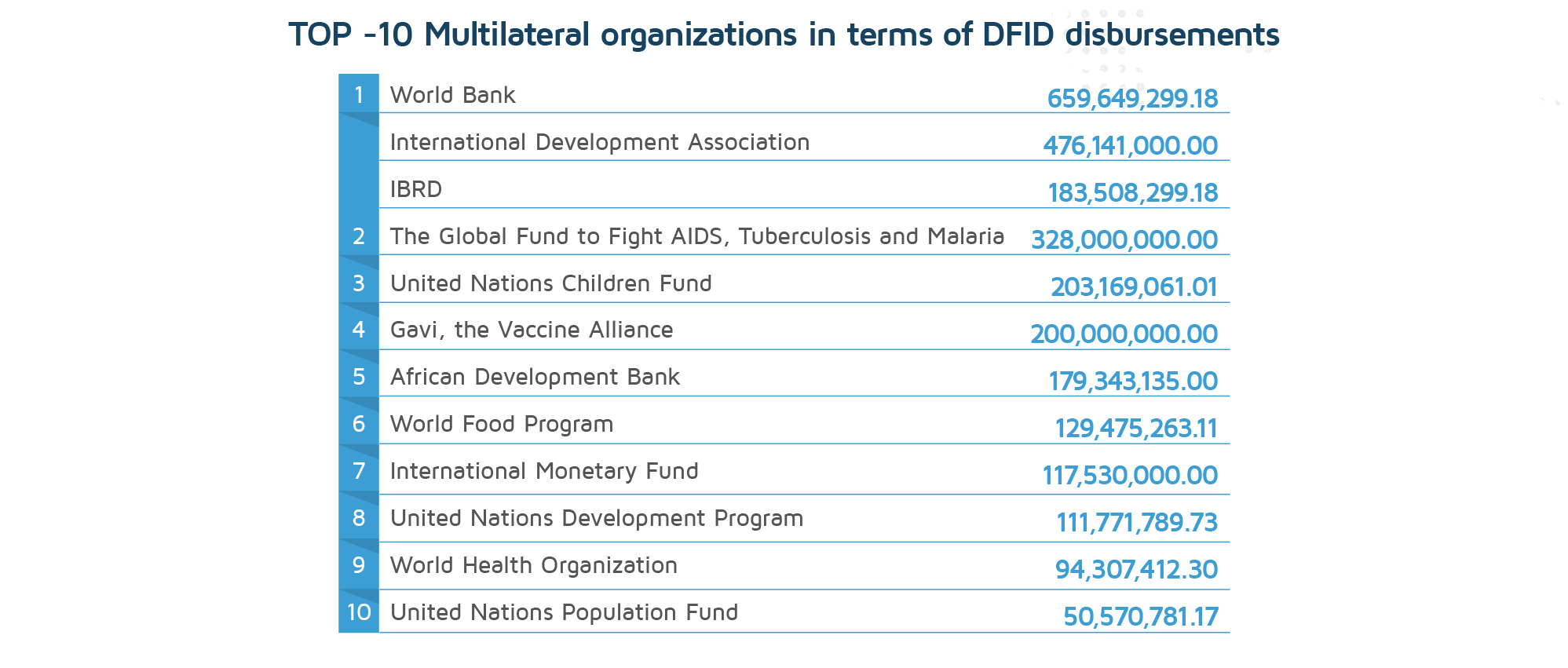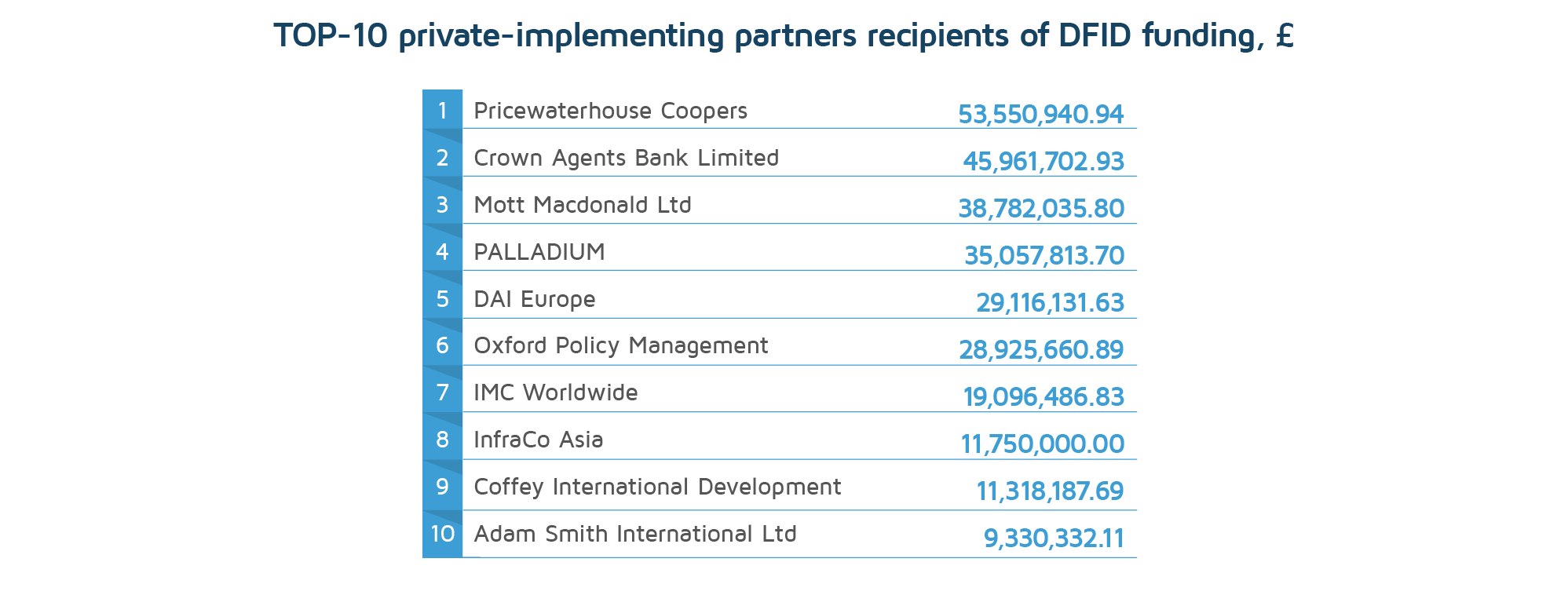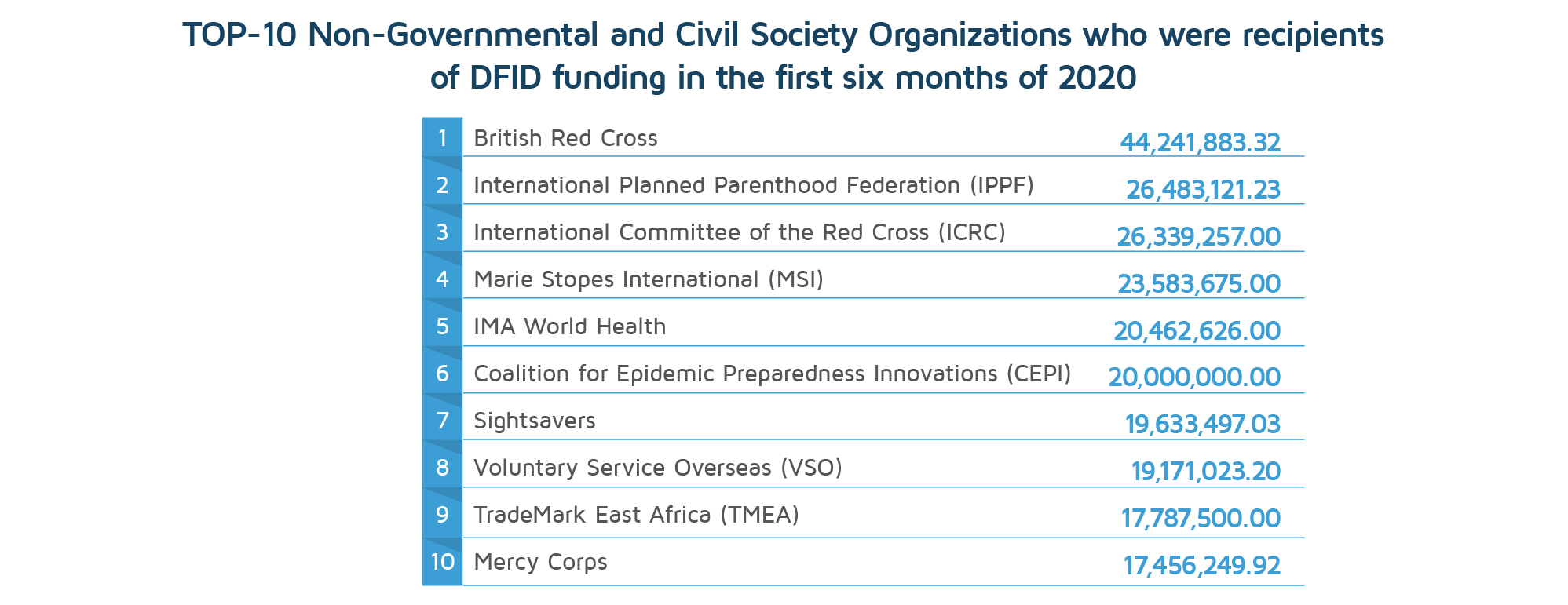The UK’s Department for International Development (DFID) provided financing to an impressive number of multilaterals, private implementing partners and NGOs in the first half of 2020. Before the UK Prime Minister Boris Johnson announced DFID’s merger with the Foreign and Commonwealth Office (FCO) and the creation of the Foreign Commonwealth and Development Office (FCDO) in June 2020, the former development aid colossus managed to disburse about £4.9 billion to its partner organizations. This amount is 1 billion more compared to the disbursements of almost £3.8 billion made in in the first six months of 2019. In today’s review, DevelopmentAid presents the TOP 10 partners of DFID in the first half of 2020, compiled on the basis of UK government data.
TOP-10 multilaterals funded by DFID
Multilaterals are an important component of the international system for humanitarian and development aid. Core multilateral development assistance is comprised of unearmarked core funding from governments to multilateral organizations (such as the United Nations agencies, the World Bank and others) which is pooled with other donors’ funding and disbursed as part of the core budget of the multilateral organization.
During the first six months of 2020, DFID spent £2.7 billion in funding the 10 largest multilateral recipients of UK development assistance.
The World Bank Group, represented by the International Development Association (IDA) and the International Bank for Reconstruction and Development (IBRD), is the largest fund recipient with almost £660 million having been committed to these two organizations. The IDA has been the largest recipient of UK multilateral Official Development Assistance since 2013. Its activities include, among others, primary education, basic health services, clean water and sanitation, agriculture and institutional reforms.
During the first six months of 2020, the IDA received £476 million while the IBRD was in receipt of £183 million.
The Global Fund to Fight AIDS, Tuberculosis and Malaria is the second most financed multilateral organization. The Fund which, according to its website, mobilizes around US$4 billion a year to support programs aimed at fighting AIDS, tuberculosis and malaria in more than 100 countries, received around £328 million from the UK’s former aid department in the first half of 2020.
The United Nations Children Fund (UNICEF) was the third largest DFID multilateral partner, receiving a little over £200 million during the first half of 2020.

Notably, the European Commission which was the second largest recipient of DFID’s development assistance, totaling almost £510 million between January and September 2019, does not appear among the DFIDs TOP -10 partner multilaterals for the period now under review.
TOP-10 private implementing partners
DFID private implementing partners include various international companies that implement, monitor and evaluate a multitude of projects and activities.
The following are the TOP 10 private implementing partners:
One of the DFID key private service suppliers is PricewaterhouseCoopers, with over £53 million transferred for services provided between January and June 2020.
The Crown Agents Bank provides management, payment and reporting services to DFID and partner governments in relation to Financial Aid grants. It is the top-second private entity, receiving almost £46 million from DFID during the six-month period.
Mott Macdonald closes the first three largest recipients of UK ODA funneled through DFID, with funding equal to almost £39 million.

TOP-10 NGOs & CSOs
NGOs and CSOs were also important delivery partners for DFID. Usually, funds funneled through these kinds of organizations are not earmarked for a particular country/region or a particular scope. Thus, various developing countries benefitted from the activities delivered by civil society and non-governmental organizations.
What does “NGO” stand for? A non-governmental organization (NGO) is a non-profit entity that exists and functions independently of any government. NGOs, often called civil societies, are organized on community, national and international levels to serve various goals such as human rights, humanitarian causes or the environment, either in their country of residence or abroad. Although non-profit entities, NGOs may oversee budgets amounting to millions.
The British Red Cross (BRC) received almost £44 million from DFID during the first six months of 2020. The organization works in both the UK and in developing countries as well as countries affected and torn by war.
Almost £26.5 million was transferred to the International Planned Parenthood Federation (IPPF), an important family planning organization that which champions sexual and reproductive health and rights for all, especially the under-served.
The International Committee of the Red Cross (ICRC) received £26.3 million of development assistance from DFID during January to June 2020.

The DFID merger with the Foreign Office
The controversial announcement regarding the merger of the DFID and the Foreign Office was made by Boris Johnson in June 2020. The UK’s Prime Minister announced the transition arguing that the merger would represent a long-term reform and would allow financial means to be better spent and would target the aims of aid according to British foreign interests.
The transition was completed in August: “The Department for International Development has closed. It’s been replaced by the Foreign, Commonwealth & Development Office (FCDO) starting September 2020” reads the agency’s website.
The new UK Government Department, the Foreign Commonwealth and Development Office, officially began its activities on 2nd September 2020.
AS the department succeeding the DFID and FCO, and the FCDO publishes hundreds of tenders and procurement notices and therefore many individual consultants and experts are employed within the activities funded by it. Details of these opportunities are also available through the DevelopmentAid platform.
As reported earlier by DevelopmentAid, information about a possible reduction in assistance with funds instead being channeled towards defense and intelligence transpired to be erroneous. According to Dominic Raab, British Minister of Foreign Affairs, the UK will not cut foreign aid budget with spending on development assistance due to remain at the current level of 0.7% of Gross National Income (GNI).
If you find the information from this review useful for your activity as a professional consultant and expert, you will definitely enjoy being a DevelopmentAid Professional member. Unlock business intelligence for development by registering today and stay up to date with the most important news from the international development sector.

